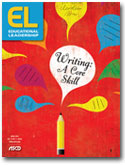When was the last time that you spent time at a faculty meeting talking about effective parent-teacher conferences? Do you share tips and ideas for these conferences with new teachers? Do you ever join a parent-teacher conference primarily to give feedback to teachers?
We principals attend conferences on instructional leadership. We give attention to the Common Core standards, test success, and teacher assessments. We attend workshops devoted to backward design, multiple intelligences, and RTI (Response to Intervention). We spend hours looking at new technology, solar energy, and building security—all worthy topics. But if we don't give much attention to how teachers and parents communicate with one another, we're missing an opportunity.
Parent-teacher conferences are formal times when parents and teachers come together to talk about a child's progress and prospects, but they should be far more. These conferences are also times for parents and guardians to learn that the teacher knows and cares for their child, opportunities to forge plans to work together, and occasions to help families feel comfortable and confident in the school community.
Interacting with adults at a conference is quite different from talking with 8- or 18-year-olds. Saying things in a way so that parents will hear and understand—particularly when information is negative—can be very difficult. It's even harder if parents feel discomfort or a lack of trust. (This difficulty makes it all the more surprising that we give so little attention to parent-teacher conferences!)
Too often, parent-teacher conferences are seen as one-way reports from teacher to parent, but a parent-teacher conference should be a collaboration. Teachers have information to share, but they also need to allocate time for questions and discussion. We all need to work to be good listeners (I sure do), and this can be difficult for people who are used to speaking to students from a position of authority. No matter how valuable our words, if we talk so much that parents can only listen, we're missing a chance to work together and serve our students better.
Good cues to get parents talking are, "What have I said that surprises you?" and "Is there anything you'd like me to explain in more detail?" When listening, it's important to focus on the speaker's words (rather than thinking of what you need to say) and to take notes. Note taking not only buttresses memory, but also shows parents that their words are valued.
A good conference includes simple strategies that attend to physical comfort. If meeting in a classroom, make sure that parents are physically comfortable and not squeezed into student-size desks; likewise, the teacher should not be behind a desk. The seating should show that teacher and parents are collaborators.
I ask teachers to share something personal about themselves at the first conference of the year; this sets the tone that parents are welcome to share and also reminds everyone that we are all on the same team. It is important to begin every meeting with a positive observation—especially if a student has been having difficulties. It's wise for teachers to relate an anecdote that captures that they know and value the student. Eliciting a smile sets the tone for further dialogue. There is much truth in the adage, "Parents need to know that you care before they will care what you know." Sometimes teachers are so intent on making their case that they neglect to invest the time to establish a relationship.
Teachers should also be sure to face the clock so that they can monitor time without glancing at their watch. Monitoring the clock enables teachers to keep the conversation on track by saying something like, "I see that we only have seven minutes left, so let me summarize what we've discussed, and then we can talk about how to proceed."
Thinking about how the meeting ends is important, too. This might include reviewing expectations, planning strategies, and determining when to next communicate. Just as at the start of the meeting, it's important to end on a positive note.
Because these interactions are so important, we should devote time to them at a faculty meeting. Asking teachers to share how they help parents become comfortable in the conference is a good way to begin. Having teachers role-play in groups of three—being a teacher, a parent, or an observer—and respond to various situations is a good way to practice these skills. Sample scenarios to role-play might be times when parents feel that their child
- Has not been challenged.
- Is being picked on by others.
- Is struggling academically.
- Needs to develop more responsibility.
It's productive to do situations twice, once with a teacher playing the parent role in a reasonable and understanding manner and once with the teacher acting as a parent with an adversarial approach. Spending five minutes, then rotating roles, and ending by talking about what worked and what didn't is very valuable. This enables teachers to practice in a safe setting and to hear feedback from their colleagues.
In my end-of-year parent survey, I ask parents whether their conferences with teachers were productive. It's important for me to know how well we shared information and conveyed that we are all on the same team. Their responses help me plan how to work with my faculty.

